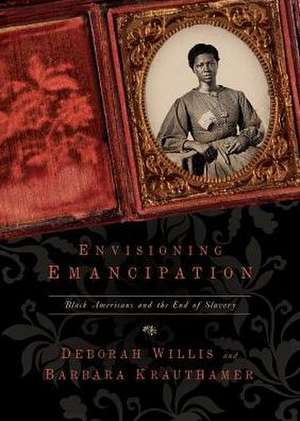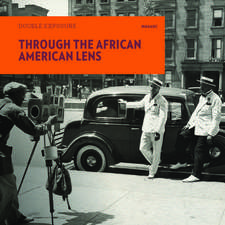Envisioning Emancipation: Black Americans and the End of Slavery
Autor Deborah Willis, Barbara Krauthameren Limba Engleză Paperback – 27 feb 2017
The Emancipation Proclamation is one of the most important documents in American history. As we commemorate its 150th anniversary, what do we really know about those who experienced slavery?
In their pioneering book, Envisioning Emancipation, renowned photographic historian Deborah Willis and historian of slavery Barbara Krauthamer have amassed 150 photographs—some never before published—from the antebellum days of the 1850s through the New Deal era of the 1930s. The authors vividly display the seismic impact of emancipation on African Americans born before and after the Proclamation, providing a perspective on freedom and slavery and a way to understand the photos as documents of engagement, action, struggle, and aspiration.
Envisioning Emancipation illustrates what freedom looked like for black Americans in the Civil War era. From photos of the enslaved on plantations and African American soldiers and camp workers in the Union Army to Juneteenth celebrations, slave reunions, and portraits of black families and workers in the American South, the images in this book challenge perceptions of slavery. They show not only what the subjects emphasized about themselves but also the ways Americans of all colors and genders opposed slavery and marked its end.
Filled with powerful images of lives too often ignored or erased from historical records, Envisioning Emancipation provides a new perspective on American culture.
In their pioneering book, Envisioning Emancipation, renowned photographic historian Deborah Willis and historian of slavery Barbara Krauthamer have amassed 150 photographs—some never before published—from the antebellum days of the 1850s through the New Deal era of the 1930s. The authors vividly display the seismic impact of emancipation on African Americans born before and after the Proclamation, providing a perspective on freedom and slavery and a way to understand the photos as documents of engagement, action, struggle, and aspiration.
Envisioning Emancipation illustrates what freedom looked like for black Americans in the Civil War era. From photos of the enslaved on plantations and African American soldiers and camp workers in the Union Army to Juneteenth celebrations, slave reunions, and portraits of black families and workers in the American South, the images in this book challenge perceptions of slavery. They show not only what the subjects emphasized about themselves but also the ways Americans of all colors and genders opposed slavery and marked its end.
Filled with powerful images of lives too often ignored or erased from historical records, Envisioning Emancipation provides a new perspective on American culture.
Preț: 142.09 lei
Nou
Puncte Express: 213
Preț estimativ în valută:
27.19€ • 29.53$ • 22.84£
27.19€ • 29.53$ • 22.84£
Carte disponibilă
Livrare economică 02-16 aprilie
Preluare comenzi: 021 569.72.76
Specificații
ISBN-13: 9781439909867
ISBN-10: 1439909865
Pagini: 240
Dimensiuni: 178 x 254 x 13 mm
Greutate: 0.52 kg
Editura: Temple University Press
Colecția Temple University Press
ISBN-10: 1439909865
Pagini: 240
Dimensiuni: 178 x 254 x 13 mm
Greutate: 0.52 kg
Editura: Temple University Press
Colecția Temple University Press
Recenzii
"Envisioning Emancipation offers an illuminating and inspiring look at the men and women who enabled, lived through, and were affected by the landmark event of emancipation. With a stunning collection of photographs accompanied by engaging new scholarship, this book is sure to have a vital and important impact on the way Americans see our nation and ourselves."-Thelma Golden, Director and Chief Curator of the Studio Museum of Harlem
"When Frederick Douglass observed that 'Negroes can never have impartial portraits at the hands of white artists,' he virtually predicted a century of derogation and invisibility for African Americans. Images of African Americans under slavery or even later during Reconstruction are notoriously rare, and there has never been a comprehensive survey of these always illuminating photographs. In Envisioning Emancipation, Deborah Willis and Barbara Krauthamer have painstakingly filled in many of the missing pieces, compiling an extraordinary photograph album of African American vernacular life that will be treasured as much for its historical insights as for its powerful aesthetic impact."-Brian Wallis, Chief Curator, International Center of Photography
"Envisioning Emancipation is a rare publication that is both intellectually innovative and emotionally enriching. Willis and Krauthamer have transformed the way scholars will look at abolitionism and the transition from enslavement to freedom by carefully recasting and reassessing black imagery to better understand and explore the intersection of race, gender, propaganda, and identity. The authors remind us that photography was a valuable and effective weapon in the struggle over the future of slavery in America, a weapon that was used, fought over, and manipulated by all involved."-Lonnie Bunch is the Founding Director of the National Museum of African American History and Culture
"Groundbreaking…Envisioning Emancipation recounts a dynamic history of black self-possession and self-determination, one that challenges the abiding myth of the crusade against slavery and segregation: that of passive black victims who obtained freedom mostly through the benevolence and generosity of their white saviors." —The New York Times Lens blog
Notă biografică
Deborah Willis, a leading historian and curator of African American photography and culture, is Chair and Professor of Photography and Imaging at Tisch School of the Arts at New York University. She was a MacArthur Fellow, a Guggenheim Fellow, and a Fletcher Fellow. Her co-authored book, Michelle Obama: The First Lady in Photographs, received the 2010 NAACP Image Award for Outstanding Literary Work-Biography/Autobiography. Her most recent books are Posing Beauty: African American Images from the 1890s to the Present and Black Venus 2010: They Called Her "Hottentot" (Temple).
Barbara Krauthamer is Assistant Professor of History at the University of Massachusetts-Amherst. She is the author of Black Slaves, Indian Masters: Slavery, Emancipation, and Citizenship in the Native American South as well as many articles and essays on the history of slavery and emancipation. She has received fellowships and awards from the Association of Black Women Historians, the National Endowment for the Humanities, Stanford University, the University of Texas at Austin, Yale University, and the Schomburg Center for Research in Black Culture.
Barbara Krauthamer is Assistant Professor of History at the University of Massachusetts-Amherst. She is the author of Black Slaves, Indian Masters: Slavery, Emancipation, and Citizenship in the Native American South as well as many articles and essays on the history of slavery and emancipation. She has received fellowships and awards from the Association of Black Women Historians, the National Endowment for the Humanities, Stanford University, the University of Texas at Austin, Yale University, and the Schomburg Center for Research in Black Culture.
Cuprins
Preface and Acknowledgments
The Emancipation Proclamation
Introduction
1 Representing the Appeal
2 A Collective Portrait of the Civil War
3 Legacies of Emancipation
Notes
Index
The Emancipation Proclamation
Introduction
1 Representing the Appeal
2 A Collective Portrait of the Civil War
3 Legacies of Emancipation
Notes
Index
Descriere
What freedom looked like for black Americans in the Civil War era








